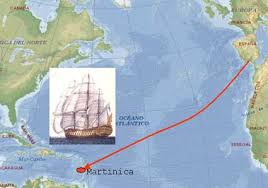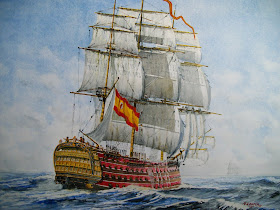The Treaty of Amiens (1802) was a treaty between wars in which Napoleon reconstructed his Armada, so Great Britain then started to reinforce the Royal Navy.
In 1803 around 20,000 people joined it, many of them recluted forcibly; and 80 new warships were launched in the period of only one year.

HMS Victory; British flagship
Source: http://blogs.elcorreo.com/modelismo/files/hms_victory_pa_416.jpgAt the beginning of the 19th century the British officers were very experienced, while the French had just gone through a revolution, so most of the French officers, who were supporters of Louis XVI, left the country, and the officers who remained didn´t have enough experience or knowledge to command the Armada. The Admiral of the Hispano-french Armada was Pierre Charles de Villeneuve.
Also the naval warfare tactics were not very different.
The French fought defensively to be able to escape. However, the British tried to sink the enemy ships.
http://lazarillo2000.blogspot.com.es/2011_10_01_archive.html
Since 1803, Napoleon was gathering his army waiting for the right moment to attack Great Britain. However, the British Navy blocked all the ports of the French and Spanish coasts, so the French couldn´t start to invade Great Britain.
In 1804, Spain and France signed an agreement in which Spain would help France in the war.
In order to get rid of of the British Navy, the French made a plan to attract the British fleet to the Caribbean Sea and that the armies of Napoleon had time to start the invasion of Great Britain.
Villeneuve would set sail to the West Indies where they would escape from Nelson, the British admiral, to join the invasion.
Villeneuve and the Hispano-French fleet weighed anchor to the West Indies on March 30, 1805 and Nelson followed them, but when they reached the West Indies Nelson's fleet appeared by surprise and Villeneuve ran away to Europe but Nelson returned quickly to Gibraltar.

Napoleon ordered Villeneuve to set sail to Naples and fight against Nelson, but Villeneuve didn´t obey, so Napoleon decided to dismiss him.
But when Villeneuve received the notice, he ordered to leave the harbor in October the 18th.
When Villeneuve saw the British fleet, he ordered to comeback to Cádiz but this only caused a disorder in the Hispano-french line. The two columns broke the allied line.
 http://inter-arma-silent-leges.blogspot.com.es/2009/06/la-batalla-de-trafalgar-la-tactica.html
http://inter-arma-silent-leges.blogspot.com.es/2009/06/la-batalla-de-trafalgar-la-tactica.html
When the British broke the allied line at 11:40 am, the battle started and the two fleets started fighting.

At 13:25 pm a French soldier in the "Redoutable" shot and killed Nelson.

At 14:00 the "Redoutable" surrendered with 568 dead sailors.
At 16:15 the "Bucentaure" with Villeneuve surrendered with only six people alive.
Finally at 17:45 pm the battle finished when the French ship "Achille" exploded, killing almost 500 people.

Villeneuve was sent as a prisoner to England, but he returned to France in 1806. On the 22nd of April Villeneuve was found dead under strange circumstances.
France lost twelve of his eighteen ships with 2,218 deads.
The British didn´t lose any ship and they "only" lost 449 people.
Spain lost ten of its fifteen ships and 1,022 people. The Spanish Armada did not recover never.
Also the Spanish Armada lost the biggest warship of the world in this era: the "Santísima Trinidad" with 140 cannons.

Napoleon focused his imperial planes only in the interior of Europe.
In the battle died, between among others:
Cosme de Churruca, Luis Perez del Camino Llarena, Duionisio Alcalá Galiano, Francisco Alcedo y Bustamante and Federico Gravina.
Admiral Horatio Nelson was sent to Great Britain where he was honored in a state funeral.
Here you have one video about the development of the battle:
The French fought defensively to be able to escape. However, the British tried to sink the enemy ships.

http://lazarillo2000.blogspot.com.es/2011_10_01_archive.html
Since 1803, Napoleon was gathering his army waiting for the right moment to attack Great Britain. However, the British Navy blocked all the ports of the French and Spanish coasts, so the French couldn´t start to invade Great Britain.
In 1804, Spain and France signed an agreement in which Spain would help France in the war.
In order to get rid of of the British Navy, the French made a plan to attract the British fleet to the Caribbean Sea and that the armies of Napoleon had time to start the invasion of Great Britain.
Villeneuve would set sail to the West Indies where they would escape from Nelson, the British admiral, to join the invasion.
Villeneuve and the Hispano-French fleet weighed anchor to the West Indies on March 30, 1805 and Nelson followed them, but when they reached the West Indies Nelson's fleet appeared by surprise and Villeneuve ran away to Europe but Nelson returned quickly to Gibraltar.
But when Villeneuve received the notice, he ordered to leave the harbor in October the 18th.
- October the 21st, 1805
When Villeneuve saw the British fleet, he ordered to comeback to Cádiz but this only caused a disorder in the Hispano-french line. The two columns broke the allied line.

When the British broke the allied line at 11:40 am, the battle started and the two fleets started fighting.

At 13:25 pm a French soldier in the "Redoutable" shot and killed Nelson.

At 14:00 the "Redoutable" surrendered with 568 dead sailors.
At 16:15 the "Bucentaure" with Villeneuve surrendered with only six people alive.
Finally at 17:45 pm the battle finished when the French ship "Achille" exploded, killing almost 500 people.
- Consecuences
Villeneuve was sent as a prisoner to England, but he returned to France in 1806. On the 22nd of April Villeneuve was found dead under strange circumstances.
France lost twelve of his eighteen ships with 2,218 deads.
The British didn´t lose any ship and they "only" lost 449 people.
Spain lost ten of its fifteen ships and 1,022 people. The Spanish Armada did not recover never.
Also the Spanish Armada lost the biggest warship of the world in this era: the "Santísima Trinidad" with 140 cannons.

Napoleon focused his imperial planes only in the interior of Europe.
In the battle died, between among others:
Cosme de Churruca, Luis Perez del Camino Llarena, Duionisio Alcalá Galiano, Francisco Alcedo y Bustamante and Federico Gravina.
Admiral Horatio Nelson was sent to Great Britain where he was honored in a state funeral.
Here you have one video about the development of the battle:

Hello Fernando! I really like your post about the Battle of Trafalgar. It is very interesting. But you have to correct some mistakes I think I have found:
ReplyDelete- Hispano-French.
- the British officers were very experienced, while the French had just gone... You have written that the French were very experienced and then you said that the officers did not have enough experience.
- The Spanish Armada did never recover. You can't deny twice.
- In the battled died, among others...
:)
Good work!
ReplyDeleteHello Fernando,
ReplyDeleteI suppose you didn´t read my e-mail. You´ve done a very good work. These are my corrections. Roxana´s corrections are OK as well:
- 20,000. Figures in English are written in a different way. If you write . , you transform the number into a decimal.
- Word order: 80 new warships were launched
- In order to get rid of the British Navy.... a plan to attract the British fleet
- Villeneuve... set sailto the West Indies: it´s more used
than "weigh anchor"
-... Nelson´s fleet: don´t write "the" before Nelson´s.
- When Villeneuve heard/received the news
- When Villeneuve saw the British fleet, he ordered to comeback
-... with 568 dead sailors
-... exploded, killing...
-Consequences
- ... until World War 2
- On the 22nd of April/ On April the 22nd
- 2,218 dead
-... they "only" lost...
- ... ten of its fifteen... and 1,022 people
- Napoleon
- Word order: Many of the most important Spanish officers died in the battle, such as...
- Admiral Nelson: take the "the" out.
That´s all! See you tomorrow!
War is a fascinating subject. Despite the dubious morality of using violence to achieve personal or political aims. It remains that conflict has been used to do just that throughout recorded history.
ReplyDeleteYour article is very well done, a good read.